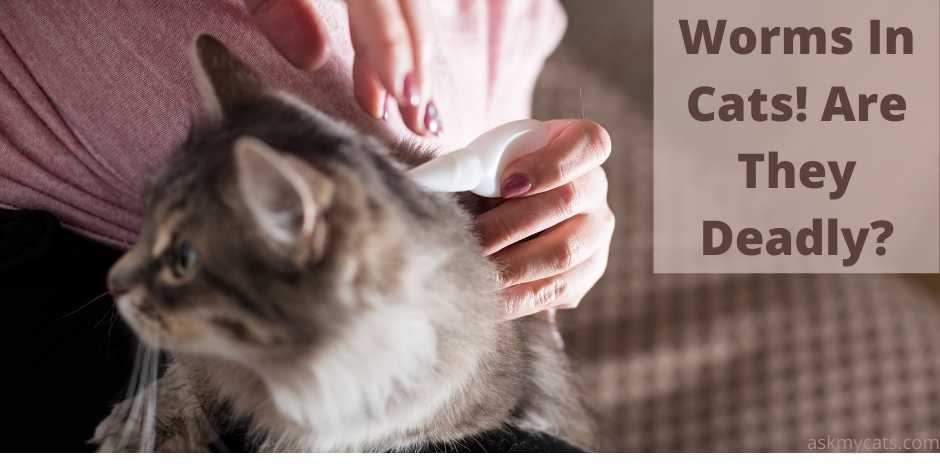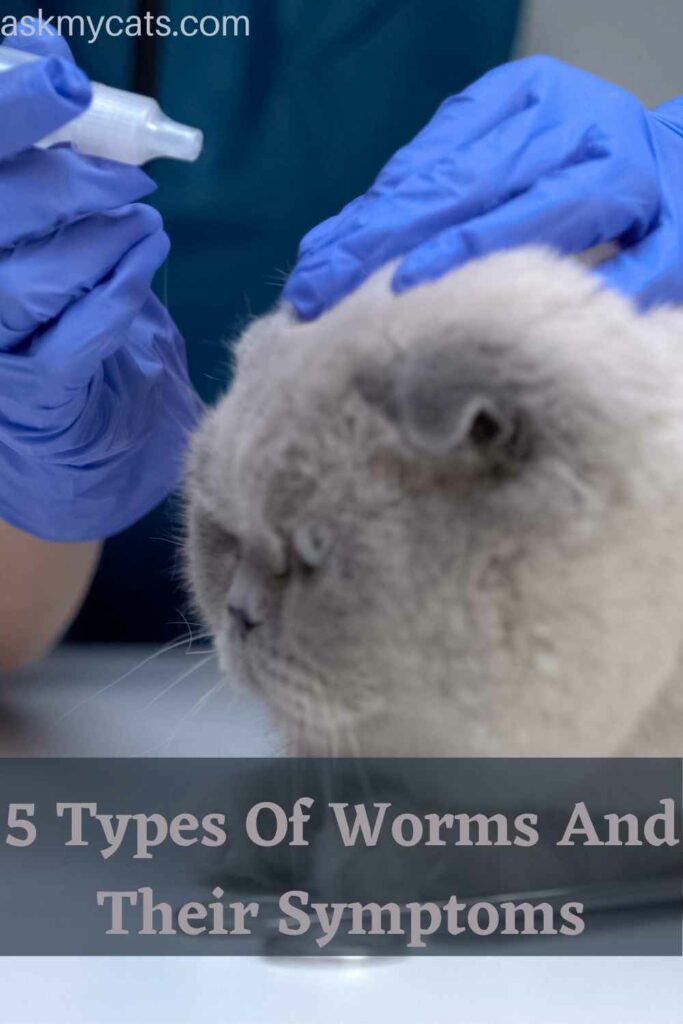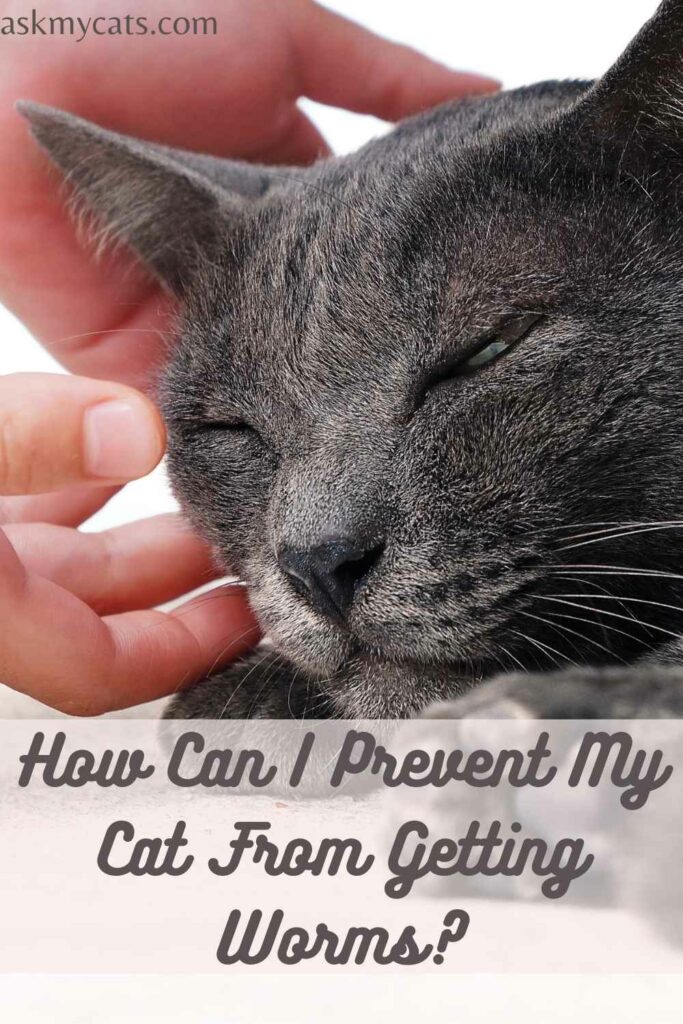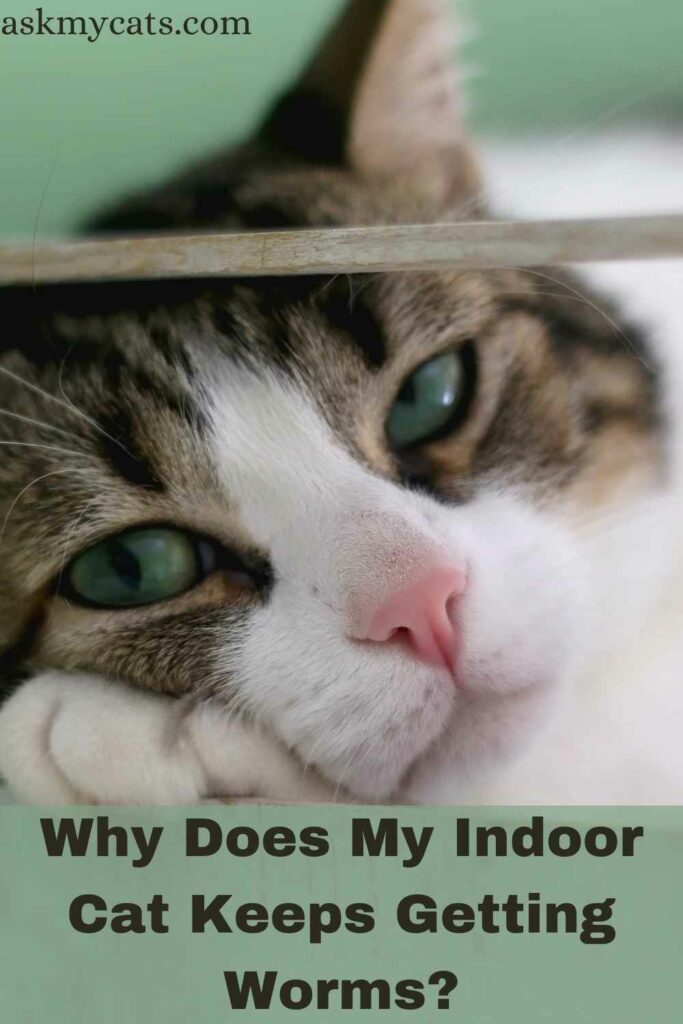All of us want our little furballs to be happy and stay healthy for the rest of their lives. However, things are not always as we expect. Discovering that your cat has worms is an unsettling experience for any cat owner.
Fortunately, there are several safe and effective ways to treat worms in cats, as well as many preventative measures you may take to reduce the likelihood of a subsequent re-infestation.
After reading this article, you will know about worms and how to get rid of them.


Give Your Cat the Perfect Day
Get the Free Ebook!
What Are The Symptoms Of Worms In Cats?
The Symptoms of worms in a cat range from entirely asymptomatic to severe and life-threatening. It depends on the type of worm and the severity of the infection.
Some of the most common signs of worms in cats include: –
- Weight Loss
- Tarry Poop
- Diarrhea
- Difficulty in breathing
- Wheezing
- Dull coat
- Weakness
- Dehydration
- Low blood pressure
- Pale lips and gums
5 Types Of Worms And Their Symptoms
Now let us dive into more specific types of worms and the symptoms they cause.

1. Roundworms
The most prevalent intestinal parasite in cats is intestinal roundworms, which can be found in cats of all ages worldwide. Toxocara cati and Toxascaris leonina are the two most frequent roundworms found in cats.
These worms’ eggs are excreted in the feces and can survive for several years in the environment. These eggs have two means of infecting other cats. First, a polluted environment may cause a cat to eat (ingest) eggs.
Second, if another animal consumes the eggs (for example, a mouse or rat), the illness can be passed on to a cat if it preys on (and eats) the infected intermediary host.
Toxocara cati is also handed on through the mother cat’s milk to her offspring. When a cat is infected with roundworms, some juvenile forms (larvae) can be found hibernating in the body’s tissues.
When a female cat becomes pregnant, the larvae migrate to the mammary glands and are expelled in the milk she provides for the kittens. Because this is such a prevalent mode of infection, we should expect every kitten to be infected with Toxocara cati.
In most circumstances, roundworm treatment should be done regularly throughout a cat’s life.
Symptoms:
- Diarrhea
- Distended abdomen
- Weight loss
- Coughing
- Pneumonia
- Vomiting
- Intestinal Obstruction
2. Hookworms
Hookworms are a form of tiny intestine roundworm that can be found in almost every country, but they are more frequent in some than others.
When these worms stick to the intestine’s surface, they can cause damage to the lining, resulting in weight loss, bleeding, and anemia.
Cats can become infected by ingesting (eating) eggs from the environment, eating an infected intermediate host (as in the case of Toxocara cati), or by larvae burrowing through the cat’s skin.
Ancylostoma tubaeforme and Uncinaria stenocephala are the most common cat hookworms, but other species are seen in different areas.
Symptoms
- Skin lesions
- Coughing
- Lack of appetite
- Pale lips and gums
- Weight Loss
- A dark or tarry stool
- Diahrrea
3. Tapeworms
Tapeworms are long, flat worms with a large number of segments. The tapeworm’s mature segments, which contain eggs, are discharged and passed in the feces.
These segments, which resemble rice grains, can be found in the cat’s hair near the anus, in the feces, and on the cat’s bed.
All tapeworms require an intermediate host to complete their life cycle. The intermediate host must first ingest the eggs from the environment, and then the cat must eat the intermediate host to become infected.
Depending on the tapeworm type, different animals serve as intermediary hosts. Dipylidium caninum and Taenia taeniaeformis are the most frequent tapeworms found in cats around the world.
Cats get infected with Dipylidium caninum, which is spread by fleas. Immature flea larvae consume the worm’s eggs, but illness is passed on to a cat when it eats an infected flea during grooming.
It should be assumed that any cat infected with fleas also has Dipylidium caninum and vice versa.
When they eat small rodents (rats and mice), Taenia taeniaeformis is passed on, with the rodents having eaten eggs from the environment. This illness is pretty frequent in hunting cats.
Symptoms
- Worm segments present on and around the anus
- Worm segments around the anal area and under the tail, attached to the fur
- Worm segments present in or on the poop of the cat
You might also like to read about should i quarantine my cat with tapeworms
4. Whipworms
Whipworms, also known as Trichuris Serrata, are named because they are shaped like a small, 45-75mm whip.
Whipworm infections are more common in dogs than in cats, although cats and kittens should still be treated cautiously.
Ingesting anything contaminated with whipworm eggs or larva can cause infection in cats. Whipworms can live anywhere from a few months to a few years in soil, food, and water. Their eggs could be discovered in feces and animal flesh.
The eggs are swallowed and go to the cat’s intestine, where they hatch after three months. Whipworms take on nutrients from your cat’s already digested food in the soft tissue.
Your cat’s immune system will quickly deteriorate, and its bowels will become irritated. Your cat will begin to lose weight, get listless, and become unwell as the whipworm absorbs so much of its nutrients.
Symptoms
- Large bowel diarrhea accompanied by blood
- Dehydration
- Anemia
- Weight Loss
5. Lungworm
Lungworm infection in the lower respiratory tract can be caused by various parasitic nematodes (roundworms), including Aelurostrongylus abstrusus and Eucoleus aerophilous in cats resulting in bronchitis or pneumonia.
Aelurostrongylus abstrusus is usually transmitted to cats through the consumption of a bird or rat that has eaten a slug or snail harboring the worms.
In cats, Eucoleus aerophilous has a natural cycle in which infective eggs are ingested with food or water.
Lungworm infections can be challenging to cure, but there is evidence that using the proper antiparasitic medication can help. Antiparasitic therapy may be required for up to two months.
Symptoms
- Coughing
- Pneumonia as the infestation worsens and symptoms progress
- Difficulty in breathing
You must read about what to expect after deworming a cat
Can Cats Get Worms From Litter Box?
Yes, cats can get worms from litter box if it is not adequately cleaned and sanitized.
Cleaning the litter box is an essential component of cat ownership. Even healthy cats’ stools can include a range of bacteria and parasites that are potentially infectious to them.
The risk of infection from handling cat litter and litter boxes can be considerably decreased with minimal effort and good basic hygiene standards.
Litter Box Tips
- Litter boxes should be cleaned regularly, ideally every day. This can also keep your cat pleased, preventing it from making messes elsewhere!
- Purchase a litter box that is designed to keep litter from overflowing even if the cat digs or buries its stool. If you have a lot of litter spills, choose a covered litter box or one with higher edges.
- Keep dogs away from the litter box so they don’t carry or spread dirty litter and the bacteria and parasites that come with it.
- Cleaning and disinfecting the area around the litter box should be done regularly. Instead of carpet, place the litter box on a smooth, easy-to-clean surface such as vinyl or tile.
Also, you might like to read about how much is it to deworm a cat
How do I Know If My Cat Has Worms?
The easiest way to know if your cat has worms is to observe them and make sure that they don’t have the following symptoms:
- Difficulty in breathing
- Wheezing
- Developing a dull coat
- Diarrhea
- Lack of appetite
- Weight Loss
- Coughing
If your cat is suffering from one of the symptoms mentioned above, chances are they have worms, and you need to get them diagnosed by a vet immediately.
You might find it interesting to know can i get worms from my cat sleeping in my bed
How Can I Prevent My Cat From Getting Worms?
Several studies show that the best way to prevent cats from getting worms is to keep them on year-round preventative medications.

The best approach to prevent intestinal worms, according to specialists, is to keep your cat on preventative meds all year.
Many heartworm preventatives also protect your cat from roundworms and hookworms, and flea preventatives help prevent tapeworms in cats. Your cat’s veterinarian can assist you in determining the best treatment options for your pet.
Experts also suggest that keeping your cat indoors (where he won’t be able to hunt sick animals) and cleaning his litter box regularly can help protect your cat from intestinal worms.
Experts stress the necessity of having your cat examined once a year because cats can have intestinal worms without showing any symptoms.
This entails bringing in a sample of your cat’s feces so that your veterinarian can do a fecal float test to check for parasite eggs.
The test is usually done as part of your cat’s annual wellness exam and can detect roundworms, hookworms, whipworms, and tapeworms.
You might also like to read about natural dewormer for cats
How Does An Indoor Cat Get Worms?
An indoor cat can get worms in several ways, including eating fleas, carries like shoes and clothes, and infected lizards and rodents.
Indoor cats will go after almost anything in the house. Rodents, insects, and other domestic pests carry worm eggs, which your cat and get infected.
Roundworm eggs can be carried by a variety of animals, including mice and common houseflies. By biting your cat, mosquitoes and ticks can spread parasites.
Even if your cat never goes outside, individuals in the family are likely to come and leave on a daily basis. Because microscopic worm eggs can stay dormant for months, they’re easy to find on clothing and shoes.
When you’re outside, you can’t totally avoid them, but you may reduce the risk of contamination by removing or sanitizing your shoes before entering the house.
Also, check out about my cat has worms how do i clean my house
Why Does My Indoor Cat Keeps Getting Worms?
The prime reason your indoor cat keeps getting worms could be that she did not get completely rid of them in the first place.

To avoid your indoor cat from keep getting worms, you can disinfect anything she touches. She cleans anything she comes into contact with.
Remove the old cat litter, clean the litter pan, and replace it with new litter. Mop the floors, steam clean the carpets, and make the beds. Any fabric or toys she uses should be washed.
If there are any other animals in the house, ensure they are free of parasites; otherwise, they will pass them on to one another. It’s also a good idea to treat your yard for fleas.
They may jump on your clothes while you’re outside, and then you will transport them inside. Ingesting infected fleas by cats might result in worms.
Take her to the doctor if these solutions don’t work or you don’t know what type of worms she has.
Do Cats Eat More If They Have Worms?
No, cats don’t eat more if they have worms. In fact, contrary to this, cats tend to eat less if they have worms.
Your cat having worms could lead to a lack of appetite and eventually weight loss. Their diet is significantly reduced, and they could even become anemic.
What Kind Of Worms Do Cats Poop Out?
Kind of worms that cats poop our are: Roundworms and Tapeworms.
Roundworms can be found in your cat’s feces or vomit. Roundworm prevention, examination, and treatment are all things that your veterinarian can assist you with.
Tapeworms look like flattened grains of rice joined together. You may see segments of tapeworm around your cat’s bottom – they break off and can sometimes be in your cat’s poop.
Can Worms Cause Gas In Cat?
Yes, worms can cause gas in cats, especially roundworms, if they are present in large numbers.
When a kitten is afflicted with a significant number of roundworms, the worms can restrict the kitten’s growth, cause serious digestive discomfort, and create excessive gas production.
These kittens frequently have a ‘pot-bellied’ appearance.
In the intestines, roundworms are free-living. Roundworms do not require an intermediate host to travel from cat to cat, but they can be disseminated by swallowing the eggs left in the feces of an infected cat.
Can Worms Kill A Cat If Not Treated?
Yes, worms can kill a cat if not treated. However, this only happens in extremely severe cases.
Before that phase comes, you want to visit your vet and get your cat diagnosed so that the treatment could start accordingly and your little feline friend could get rid of the worms.
Frequently Asked Question?
Should I Consult the vet immediately if my cat has worms?
Ans. Yes, you should consult your vet immediately if your cat has worms and show severe symptoms as it could prove to be fatal if left untreated.
What worming products should I use?
Ans. There are several different worming products available in the market. Your best course of action should be to consult your vet as he could diagnose your cat and suggest the product accordingly.
What is the deadliest worm my cat could get?
Hookworms are considered to be the most deadly worms that could be found in a cat because of the risk of intestinal bleeding. Fortunately, unlike other forms of worms, this parasite is less common in cats.
Final Words
Cats could indeed get infected by a number of different worms in several ways. However, the good news is they could be treated relatively quickly if the proper measures are taken.
So, if you ever find your cat infected with worms, don’t panic, remain calm, and consult your vet. Your cat will be up and running in no time.
